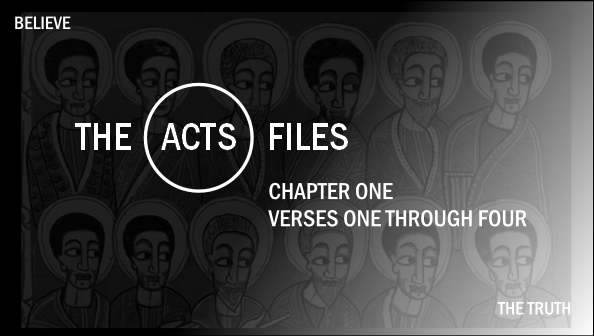By Tyson Thorne

Acts picks up where the Gospel of Luke leaves off, with Jesus’ final moments among the disciples and his ascension to heaven and glory. The author makes very clear in the first sentence a great many truths, the first of which is that this account is a continuation of the previous and is meant to be delivered first to the same man, Theophilus. Almost nothing is known of this historical personage, and many theories abound. The confusion stems from the fact that the Greek word “Theophilus” (sometimes also rendered “Theophilos”) is both a common name and title, similar to female names Grace and Faith today. Therefore two systems of thought have arisen regarding the identity of Theophilus, one stating it is not a person or individual but to all who consider themselves a “friend of God”, which is the literal translation of the name. The other avenue of thought is that the word is used to refer to a single individual, of which many people have been suggested as the acclaimed Theophilus.
Among those believed to be the mysterious character are Paul’s lawyer in Rome, Theophilus ben Ananus the high priest of the temple in Jerusalem from 37 to 41 AD, Mattathias ben Theophilus who served as the temple priest in Jerusalem for two years (65 and 66 AD), and Prefect of Rome Titus Flavius Sabinus II. The evidences for any of these men being the recipient are few. The most compelling arguments, however, are made for either Theophilus ben Ananus or Titus Flavius Sabinus. Either way, clearly Luke wanted all the readers to understand that this is a continuation of his gospel even though he never names himself as the author.
Also in the first verse he references Jesus’ ascension which is the final scene of his gospel and which he briefly expands upon in verses six through 11. In verse two we see an interesting specification regarding the disciples; they are “the apostles he had chosen.” This is important as verses 12 to the end of the chapter discuss the apostles choosing a replacement for Judas Iscariot, and of course later in the book we are introduced to Saul who becomes the apostle Paul even though he was not a follower of Jesus until after the ascension. So important is this fact that he iterates in verse three, “to these same apostles…”
While Luke does not tell us here what the “many convincing proofs” are which the Messiah provided them, he did disclose them in his gospel account. When Jesus appeared to them he let the disciple see and touch his wounds from the cross, and ate with them to prove he was not merely a spirit entity but rather a resurrected man.
We are also told that Jesus stayed with them for 40 days causing some to wonder why Luke was so specific about this time frame. Whether it was Luke’s intention or not, it does help us identify the exact timing of the coming of the Holy Spirit. The timing of all the significant events revolving around Jesus’ first coming took place on feast days. Jesus was killed on Passover, the feast foretelling the death of the Messiah. He was buried at the beginning of the Feast of Unleavened Bread which represented the Messiah’s purity at death and the fact that his body would not see decay. Jesus rose from the grave on the day of the Feast of First Fruits which prophesied the Messiah to be the first to be resurrected from the dead. How does this help us understand the opening of the book of Acts?
Because the coming of the Holy Spirit Jesus talks about also takes place on a feast day. Starting on the first day of the Feast of Unleavened Bread, the Israelites were to count seven sevens, that is seven sets of seven days (or seven weeks) and on the next day celebrate The Feast of Weeks. In other words, 50 days after Christ was in the tomb came the Feast of Weeks, which in the Greek language was known as Pentacost (“penta” meaning 50). Since Jesus did not appear to the disciples immediately after his resurrection, and spent 40 days with them when he did, it seems the disciples did not have long to wait – perhaps a few days – before the Holy Spirit came upon them.
|
|
|
